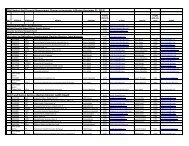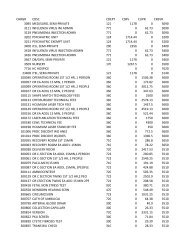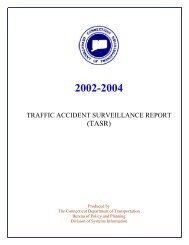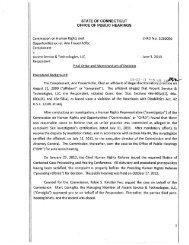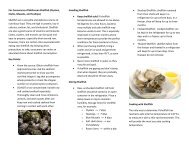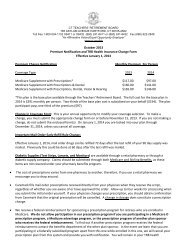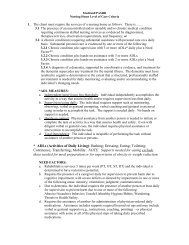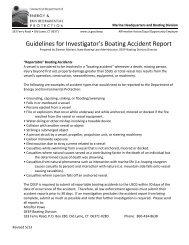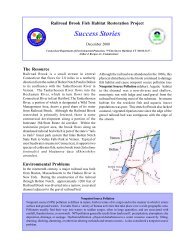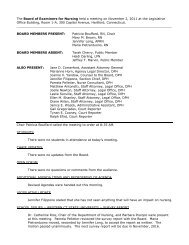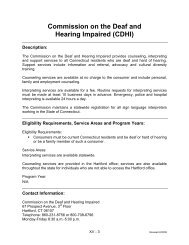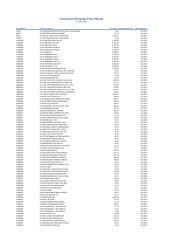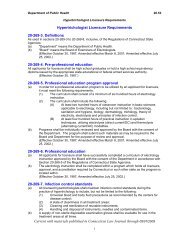Public Act 490 Guide - CT.gov
Public Act 490 Guide - CT.gov
Public Act 490 Guide - CT.gov
Create successful ePaper yourself
Turn your PDF publications into a flip-book with our unique Google optimized e-Paper software.
QDoes my land qualify for open space<br />
under PA <strong>490</strong>?<br />
A Not every municipality in Connecticut offers the<br />
open space classification. Some municipalities permit any<br />
land above the minimum acreage required by zoning that<br />
is not developed to be so classified. Other municipalities<br />
offer the open space category only to landowners who<br />
have property in an area that has been designated as<br />
“open space” on the municipality's plan of conservation<br />
and development. Some towns have minimum acreage<br />
requirements. Property owners interested in this classification<br />
should consult with their local assessor to see if<br />
this is available in their town, and if so, what the specific<br />
requirements are.<br />
Q What if my assessor denies my application?<br />
A If you anticipate that there might be questions<br />
concerning the approval of your request for farmland,<br />
forest or open space designation, you should get help in<br />
preparation of your application; the presentation of information<br />
in the application can be very important. You may<br />
benefit from the advice of an attorney. It is also suggested<br />
that you contact the Connecticut Farm Bureau, Connecticut<br />
Department of Agriculture, or the Cooperative Extension<br />
System before you submit your application. These service<br />
agencies do not offer legal advice but they may be able to<br />
provide practical suggestions that improve your prospects<br />
for approval. As a taxpayer, if your application is denied,<br />
you have the right to appeal your assessor's decision to<br />
your town's Board of Assessment Appeals and to continue<br />
from there on to Superior Court. The quality of your application<br />
and the data supplied in it can make a tremendous<br />
difference in your chances of success on appeal.<br />
Q Do I have to apply for it every year?<br />
A No. Once you have been granted a farm, forest, or<br />
open space land classification under <strong>Public</strong> <strong>Act</strong> <strong>490</strong>, the<br />
classification can only be removed by the assessor if the<br />
use of the land changes to a use inconsistent with its<br />
classification or the land ownership changes. Nevertheless,<br />
your town may periodically ask you for an update of the<br />
usage of your <strong>Public</strong> <strong>Act</strong> <strong>490</strong> land, especially if a new<br />
assessor is hired. Often you may be asked to complete<br />
another application form. In many cases a new application<br />
may not be appropriate and it may lead to some confusion<br />
that should be resolved before you proceed. Once the<br />
ownership of the land changes (for whatever reason), the<br />
farm, forest, or open space land classification can be<br />
terminated, and the new owner(s) must reapply. Families<br />
should seek legal advice prior to transferring land for estate<br />
planning reasons to avoid unexpected consequences.<br />
Also, the exemptions set forth in CGS Section 12-504c<br />
should be consulted and complied with, if possible.<br />
QHow do I obtain the application form that<br />
tax assessors use to determine if my land can<br />
be classified as farm, forest or open space under<br />
<strong>Public</strong> <strong>Act</strong> <strong>490</strong>?<br />
A Applications are available from your local assessor’s<br />
office and Connecticut Farm Bureau Association. Visit the<br />
Connecticut Association of Assessing Officers’ website at<br />
www.caao.com to download an application.<br />
Q<br />
Is <strong>Public</strong> <strong>Act</strong> <strong>490</strong> fair to my town and<br />
other property taxpayers?<br />
A When the legislature passed <strong>Public</strong> <strong>Act</strong> <strong>490</strong> in 1963,<br />
it included (and continues to include to this day) the wording<br />
that "it is in the public interest to encourage the preservation<br />
of farm, forest, and open space land." The legislature<br />
made a public finding, unique in the tax laws, that the PA <strong>490</strong><br />
program contributes net value to our state’s citizens. In<br />
addition, even with the lower property taxes collected, the<br />
towns do not sacrifice property tax revenues because of<br />
<strong>Public</strong> <strong>Act</strong> <strong>490</strong>. Studies done across the nation, and closer to<br />
home by the American Farmland Trust, have conclusively<br />
proven that property tax revenues generated by farm,<br />
forest, or open space land, are far greater than the expenditures<br />
by the town to service that land. On the other hand,<br />
the residential sector costs a town more to service then the<br />
amount of property tax generated from that sector. Thus, the<br />
preservation of farm, forest, and open space land through<br />
this method can actually help control and maintain reasonable<br />
rates of property taxation for all of a town's taxpayers.<br />
PA<br />
<strong>490</strong><br />
SE<strong>CT</strong>ION 14: FREQUENTLY ASKED QUESTIONS REGARDING PA <strong>490</strong><br />
Connecticut Farm Bureau Association • http://www.cfba.org/pa<strong>490</strong>guide.htm • <strong>Public</strong> <strong>Act</strong> <strong>490</strong>: A Practical <strong>Guide</strong> and Overview<br />
31



